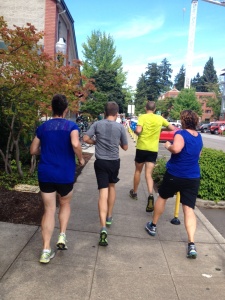
The first mile of a run is pretty typically…
…a liar.
Those first few minutes are not the whole truth. It’s not even an accurate indicator of what’s to come. It won’t be how the entire run goes. You learn that you just kind of have to grit your teeth, ignore the lies and look for a spot to settle into…
Runners seem to all know this truism about that first mile. Most runners are merciful enough to pass this wisdom along quickly to newbies they encounter.
Just ask my friend Jeff about that first mile.
The first mile we ran together? This normally energetic and happy and optimistic person was … well… suddenly very NOT.
Not at all the happy, funny, positive guy I’m used to being around. I kept encouraging him. ‘Jeff – the first mile sucks. It will get better. Hang in there. Keep moving.’
He made some pretty pointed comments to me that can’t be repeated on this blog. Use your imagination. He sure did.
By mile three he was finally settling in and ready to kick into high gear.
He was no longer cussing me.
And most notably? He was smiling again.

I got to thinking about this concept/phenomena the other day when I was running (comfortably and beyond that first mile). Why is it that with close to three years (averaging six days a week…) of working toward becoming a runner — why does that first mile still just kind of suck?
Let me reiterate something important… I am NOT talking about THE WHOLE run. It really is just that ‘getting started’ part of each run that is not to be trusted.
Even this morning on a short, easy run on familiar and favorite terrain — it takes me a mile or two (or three on some days) to settle in, get a rhythm, push the naysayers that are screaming in my head out of my brain.
It takes me some time to simply battle it out with my legs and brain and heart and get all systems to accept that I’m going to run no matter what other plans or ideas they may collectively think they have. So they should all just shut up and start working together already, please and thank you.
You’re really wanting to ask me why… WHY do I keep running if it’s that hard each and every time I lace up my shoes and get started?
Good question.
Very good question.
One I ask myself often.
It is because I know how I feel when I’m DONE running.
Not just a single run, mind you, I am talking about the cumulative HABIT and lifestyle of running.
No matter how poorly I may do in a single day, how much I fight my mind at the start, how wet/cold/hot/sweaty/grumpy/dirty/chafed I am, even if I trip and fall flat on my face…
I never, not once, no matter how good/bad/weird/hard the run is…
I never regret RUNNING.
Running as a habit buys me endurance and health and strength and pride in myself and a growing trust in my body’s ability to do difficult things. This doesn’t even touch on the other perks running has dropped in my life… The friends, scenery, memories, laughter, enjoyment of being outdoors and discovering (after40 years!) the pure joy of being ALIVE and moving.
After that first mile or two, I almost always hit a groove or at least find a spot of some comfort with the routine. My mind begins to settle down, my feet get more comfortable finding the earth and my heart starts trying to find the sky. 🙂
And besides, I will often remind myself, no one ever said the good things in life would come easy or be comfortable.
And the consistent, persistent habit of running?
It has very literally saved my life.
Running is hard. Making the time is hard. Fighting through some initial discomfort each time, each day, is hard.
All of that is still far easier than living with type 2 diabetes and obesity.
Running is just one of several important tools that help me continue in the process of cementing a lifestyle shift that keeps 220 pounds lost and gone. Eating well and being active daily is what we hope, if I am lucky, will keep diabetes away for a few glucose-stable decades.
When that first mile sucks — all of THAT is what I try to remember.
When I start my Garmin and head out on a run, I use that first mile to try to remind myself of where I was four short, fat, unhealthy years ago.
I focus on the result and reward that I know – for me personally – comes from the process of fighting through that first mile day in and day out.
I think about how hard I have worked to create a new healthy lifestyle.
I think about being handed a bone-fide second chance at living life to the fullest.
I think about no longer being T2 diabetic or taking shots or swallowing handfuls of prescription meds.
I often think about how I have the ability and capability to run and walk and move when others do not and can not…
That first mile can lie all it wants.
I’m done listening.
I’m in this for the long run. (Pun intended.) 🙂
What do you do to get through that ‘first mile’ of whatever tough activity you have in front of you?


